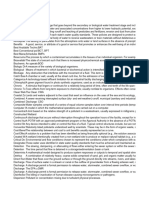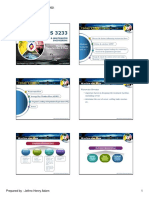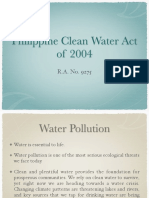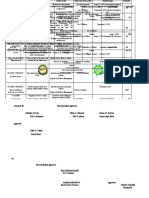0 ratings0% found this document useful (0 votes)
52 viewsIllicit Discharges Program: Reporting Tips
Illicit Discharges Program: Reporting Tips
Uploaded by
Sean CrossCDOT has a permit to discharge stormwater from its drainage system into waterways, but not other pollutants. The permit requires CDOT to implement programs to prevent pollutants from entering storm drains. These include construction site management, illicit discharge detection and elimination, and public education. Through its illicit discharge program, CDOT works to identify and remove unauthorized discharges into storm drains, which can otherwise carry pollutants into local waterbodies.
Copyright:
© All Rights Reserved
Available Formats
Download as PDF, TXT or read online from Scribd
Illicit Discharges Program: Reporting Tips
Illicit Discharges Program: Reporting Tips
Uploaded by
Sean Cross0 ratings0% found this document useful (0 votes)
52 views2 pagesCDOT has a permit to discharge stormwater from its drainage system into waterways, but not other pollutants. The permit requires CDOT to implement programs to prevent pollutants from entering storm drains. These include construction site management, illicit discharge detection and elimination, and public education. Through its illicit discharge program, CDOT works to identify and remove unauthorized discharges into storm drains, which can otherwise carry pollutants into local waterbodies.
Original Description:
stormwater
Original Title
cdot-idde-factsheet_1-21-08
Copyright
© © All Rights Reserved
Available Formats
PDF, TXT or read online from Scribd
Share this document
Did you find this document useful?
Is this content inappropriate?
CDOT has a permit to discharge stormwater from its drainage system into waterways, but not other pollutants. The permit requires CDOT to implement programs to prevent pollutants from entering storm drains. These include construction site management, illicit discharge detection and elimination, and public education. Through its illicit discharge program, CDOT works to identify and remove unauthorized discharges into storm drains, which can otherwise carry pollutants into local waterbodies.
Copyright:
© All Rights Reserved
Available Formats
Download as PDF, TXT or read online from Scribd
Download as pdf or txt
0 ratings0% found this document useful (0 votes)
52 views2 pagesIllicit Discharges Program: Reporting Tips
Illicit Discharges Program: Reporting Tips
Uploaded by
Sean CrossCDOT has a permit to discharge stormwater from its drainage system into waterways, but not other pollutants. The permit requires CDOT to implement programs to prevent pollutants from entering storm drains. These include construction site management, illicit discharge detection and elimination, and public education. Through its illicit discharge program, CDOT works to identify and remove unauthorized discharges into storm drains, which can otherwise carry pollutants into local waterbodies.
Copyright:
© All Rights Reserved
Available Formats
Download as PDF, TXT or read online from Scribd
Download as pdf or txt
You are on page 1of 2
Water Quality Program
Illicit Discharges Program
CDOT has a permit from the Colorado Department
catch basin
of Public Health and the Environment (CDPHE) to
sewer pipe
storm drain
pipe
discharge stormwater from our storm drain system. The
permit states that only stormwater (and a few other
TO THE WASTEWATER TO THE LOCAL
TREATMENT PLANT WATERBODY
allowable discharges like landscape irrigation overflow)
Stormwater runoff enters the storm drain system, which is can be discharged from CDOT’s storm drain system.
different from the wastewater system. Stormwater runoff
drains to waterways untreated. Pollutants, such as dirt; fertilizers; pesticides; and oil
and grease, antifreeze; and other automotive fluids are
strictly prohibited from being disposed of in CDOT’s
What is stormwater runoff?
Reporting tips: Stormwater runoff occurs when
storm drain system.
For your safety, stay clear of any suspected illicit precipitation from rain or snowmelt
discharge or polluted flow. Do not touch it or try flows over the ground. Impervious As part of the permit, CDOT has several different
to clean it up. To ensure your safety and maintain surfaces like roads and sidewalks programs to prevent pollutants from entering the storm
evidence, only trained personnel should take prevent stormwater from naturally
drain system. The programs are:
samples. Your first response should be to call the soaking into the ground.
CDOT Illicit Discharge Hotline. CDOT maintenance • Construction sites program
employees should follow the directions of the • New development and redevelopment program
maintenance supervisor and the authorities who will
respond to the scene. • Illicit discharges program
• Industrial facilities program
Note the location/mile marker of the problem, the quantity and nature (color/odor)
of the substance, if the discharge is flowing into a waterway, any information • Public education and involvement program
on suspicious activities, and the vehicle license number or names of people • Pollution prevention and good housekeeping
potentially involved in the spill or dumping. program
• Wet weather monitoring program
For more information:
Contact
Why is stormwater runoff a
Rick Willard
Environmental Programs problem?
4201 East Arkansas Avenue Stormwater can pick up debris,
Shumate Building chemicals, dirt, and other pollutants
Denver, CO 80222 and flow into CDOT’s storm drain
system or directly into a stream, river,
303-757-9343 lake, wetland, or reservoir. Anything
Richard.Willard@dot.state.co.us that enters CDOT’s storm drain
system is discharged untreated into
CDOT’s stormwater program website: www.cdoth2o.com the waterways we use for fishing,
CDOT MS4 Helpline: 303-918-7535 swimming, and providing drinking
CDOT Illicit Discharge Hotline: 303-512-4H2O (4426) water.
Illicit discharges program Identify
illicit What to report
Through their permit with CDPHE, CDOT has a legal
responsibility to control pollutants from being discharged into discharges
the storm drain system. The purpose of the Illicit Discharges Warning signs of illicit
Program is to identify and eliminate any discharge to an MS4 discharges include vi-
that is not composed entirely of stormwater (unless authorized sual clues in the storm-
by a separate permit from CDPHE). Illicit discharges are also water, such as discol-
known as illegal discharges and CDOT employees and citizens oration, presence of
can help prevent these discharges from polluting stormwater. surface scum, oil sheen
Common illicit discharges to CDOT’s storm drain system or turbidity, or a pun-
Allowable discharges into CDOT’s storm include sewage from accidental cross connections; septage gent odor from or near
drain system include the following: from improperly maintained septic systems; washwater flows the drain or inlet. Other clues include the presence of stains,
n Landscape irrigation from street cleaning; oil, fuel, antifreeze, grease, fertilizers, oils, or debris adjacent to CDOT roads and inlets.
pesticides, herbicides, and grass clippings dumped into Oil, gas, etc. entering a storm drain.
n Diverted stream flows
CDOT’s storm drain inlets. Evidence of illicit discharges also can be seen from observing
n Rising ground waters outfalls that collect runoff from storm drains and drain into a
CDOT’s Illicit Discharges Program consists of the following waterway. When the outfall is discharging a flow during dry
n Uncontaminated ground water
activities: weather, there could be a problem. If any of these warning
infiltration to separate storm sewers
• Prevention of illicit discharges and improper disposal. This signs exist, please call the CDOT Illicit Discharge Hotline at
n Uncontaminated pumped ground includes the prohibition of illicit discharges into CDOT’s 303-512-4H2O.
water storm drain system and employee education. Soap suds
n Discharges from potable water CDOT needs your help to prevent pollutants from being exiting a
• Ongoing field screening. This includes developing a storm dumped or spilled into its storm drain system. CDOT
sources
drain system map and inventorying all outfalls in CDOT’s employees and citizens can report pollution or questionable
storm drain
n Foundation drains storm drain system. system pipe.
discharges to highway storm drains or waterways:
n Air conditioning condensation • Investigation of suspected illicit discharges. CDOT has CDOT Illicit Discharge Hotline:
n Irrigation water a hotline (303-512-4H2O) to call if anyone (CDOT 303-512-4426 (303-512-4H2O)
employees and citizens) suspects an illicit discharge and
n Springs CDOT Water Quality Program Website: www.cdoth2o.com
CDOT has procedures in place to respond to all suspected
n Water from crawl space pumps illicit discharges. CDPHE Emergency Spill Reporting: 1-877- 518-5608
n Footing drains • Procedures to prevent, CDOT Water Quality Program Manager:
contain, and respond Rick Willard 303-757-9343
n Lawn watering
to spills. CDOT CDOT employees and citizens can report spills on CDOT
n Individual residential car washing maintenance staff are Chemical spilled on a highway.
highways:
n Individual residential swimming pool educated on the proper For hazardous spills, or if not known:
and hot tub discharges procedures to prevent, CO State Patrol, 24 Hour Dispatch: 303-239-4501
contain, and respond to National Response Center: 800-424-8802
n Individual residential street washing
spills.
n Water-line flushing For non-hazardous spills:
CDOT Regional Maintenance Superintendent
n Flows from riparian habitats and
or CO State Patrol (above)
wetlands
Regional Maintenance Superintendents
n Flows from emergency fire fighting
R1 (Sec. 5) 303-757-7649, (Sec. 9) 303-512-5730
activities
R2 719-546-5419
n Water incidental to street sweeping R3 (Sec. 1) 970-824-5104, (Sec. 2) 970-248-7360
(including associated side walks and R4 970-353-1232 Sediment from an unknown source
medians) and that is not associated entering a stream.
R5 (Sec. 3) 970-385-1650, (Sec. 7) 719-589-3616
with construction
R6 303-757-9514
You might also like
- Environmental Management Plan (EMP)Document2 pagesEnvironmental Management Plan (EMP)Cloyd Richard La Rosa100% (1)
- Storm Drainage System ASPE PDFDocument16 pagesStorm Drainage System ASPE PDFmichaelmangaa100% (1)
- LO3: Handle Materials and Equipment According To workplace/OHS ProcedureDocument37 pagesLO3: Handle Materials and Equipment According To workplace/OHS ProcedureRizaLeighFigues100% (4)
- The SuDS Manual C697Document9 pagesThe SuDS Manual C697GANGA RSNo ratings yet
- EIA For AP-ADE Park Anantapur PDFDocument265 pagesEIA For AP-ADE Park Anantapur PDFNUTHI SIVA SANTHANNo ratings yet
- Illicit Discharges Program: Reporting TipsDocument2 pagesIllicit Discharges Program: Reporting TipsSean CrossNo ratings yet
- Guidelines For The Design of Small Sewage Treatment Plants - Environmental Protection Department2Document2 pagesGuidelines For The Design of Small Sewage Treatment Plants - Environmental Protection Department2Issac SitNo ratings yet
- 6 Waste Water Flow and Preliminary Treatment of Waste WaterDocument3 pages6 Waste Water Flow and Preliminary Treatment of Waste WaterRocky SioresNo ratings yet
- Vocabulary Catalog List Detail Report 20240514-174208Document36 pagesVocabulary Catalog List Detail Report 20240514-174208edisonzs024No ratings yet
- 171 Sand FilterDocument0 pages171 Sand FilterKhaled AbdelbakiNo ratings yet
- Sewage Treatment (Wsst4026)Document140 pagesSewage Treatment (Wsst4026)tarewatersNo ratings yet
- Wastewater Flow & Preliminary Treatment of Wastewater (Chapter 6)Document2 pagesWastewater Flow & Preliminary Treatment of Wastewater (Chapter 6)Kimberly Shawn Nicole SantosNo ratings yet
- Piggery ProjectsDocument3 pagesPiggery ProjectsMichael Ryan Montealto100% (1)
- Drainage (Pond-Wetland Report)Document14 pagesDrainage (Pond-Wetland Report)Azizi RazakNo ratings yet
- ReportsDocument3 pagesReportsloocgemNo ratings yet
- Biological Treatment Checklist - Attached Growth - Trickling Filter, Rotating Biological Contactor (RBC)Document9 pagesBiological Treatment Checklist - Attached Growth - Trickling Filter, Rotating Biological Contactor (RBC)Magin Idelfonso TorreblancaNo ratings yet
- Introduction To Water-Carriage Sanitation SystemsDocument14 pagesIntroduction To Water-Carriage Sanitation Systemssirajt300No ratings yet
- Water 14 01201 v2Document26 pagesWater 14 01201 v2ir_zainalNo ratings yet
- Green Compliance - WPCO (New)Document9 pagesGreen Compliance - WPCO (New)forplayinggame120No ratings yet
- En - EnvStand17 - Industrial and Municipal Wastewater DischargesDocument17 pagesEn - EnvStand17 - Industrial and Municipal Wastewater DischargesWellfroNo ratings yet
- CWA-IRR Clean Water ActDocument50 pagesCWA-IRR Clean Water ActWenna Lee LoremiaNo ratings yet
- DCW Type SewageDocument13 pagesDCW Type SewageDara FinaldaNo ratings yet
- 54 Boatyard Wastewater Treatment Guidelines - kcr1424Document30 pages54 Boatyard Wastewater Treatment Guidelines - kcr1424gmpintorNo ratings yet
- Control of Resuspended Sediments in Dredging ProjectsDocument12 pagesControl of Resuspended Sediments in Dredging ProjectsWellfroNo ratings yet
- CHAPTER 5 Urban Drainage DesignDocument28 pagesCHAPTER 5 Urban Drainage DesignRaja Norazilla Raja YunusNo ratings yet
- Today's Objectives: KNS3233 Water & Wastewater EnggDocument9 pagesToday's Objectives: KNS3233 Water & Wastewater EnggAriff JasniNo ratings yet
- Low Impact Development For Stormwater MANAGEMENT (Group ID: 317)Document1 pageLow Impact Development For Stormwater MANAGEMENT (Group ID: 317)Rohan LakhaniNo ratings yet
- Jacobs: Company Procedures Manual Revision Record No. PR 19.02-1Document23 pagesJacobs: Company Procedures Manual Revision Record No. PR 19.02-1billNo ratings yet
- 6 Waste Water Flow and Preliminary Treatment of Waste WaterDocument24 pages6 Waste Water Flow and Preliminary Treatment of Waste Waterfranz sarolNo ratings yet
- Detention Pond Design StormDocument18 pagesDetention Pond Design StormMd Mamunur RashidNo ratings yet
- A.1 Site Development Including Minor Excavation: Batching and Crushing PlantDocument4 pagesA.1 Site Development Including Minor Excavation: Batching and Crushing PlantJaja BarredoNo ratings yet
- Icm B3Document4 pagesIcm B3Nermeen AhmedNo ratings yet
- USEPA Hydrodynamic SeparatorsDocument6 pagesUSEPA Hydrodynamic SeparatorsJp TreacyNo ratings yet
- W A T E R B U R E A U: Requently Sked UestionsDocument3 pagesW A T E R B U R E A U: Requently Sked UestionsVineet ChaudharyNo ratings yet
- Principles and Technical Application of Mixing Zones For Wastewater Discharges To Freshwater and Marine EnvironmentsDocument27 pagesPrinciples and Technical Application of Mixing Zones For Wastewater Discharges To Freshwater and Marine EnvironmentsJorge Ricardo AlcivarNo ratings yet
- Drainage System in DelhiDocument41 pagesDrainage System in DelhiziaiitdNo ratings yet
- Drainage Criteria Manual v.2 - City of Colorado Springs PDFDocument134 pagesDrainage Criteria Manual v.2 - City of Colorado Springs PDFAnonymous cncdtlNNo ratings yet
- Chapter-4 Sewarage SystemDocument65 pagesChapter-4 Sewarage SystemGebrewahid AdhanaNo ratings yet
- WEEK-1 and 2 SE-407Document6 pagesWEEK-1 and 2 SE-407Marielle BrionesNo ratings yet
- Clean Water ActDocument27 pagesClean Water ActRonald MorenoNo ratings yet
- 4 Com-Cg-12-0020 Water Intrusion 08 30 2018 1Document4 pages4 Com-Cg-12-0020 Water Intrusion 08 30 2018 1api-576583097No ratings yet
- Environmental Management Plan (EMP)Document3 pagesEnvironmental Management Plan (EMP)Fritzie Jane SalidoNo ratings yet
- Glass Clay Cement Concrete Gypsum NOI1Document2 pagesGlass Clay Cement Concrete Gypsum NOI1Antonio QuirozMaganNo ratings yet
- Basic Principles and Concepts of DrainageDocument4 pagesBasic Principles and Concepts of DrainagejohnsonNo ratings yet
- D Rainclean 11Document12 pagesD Rainclean 11joebriffaNo ratings yet
- Emb Memorandum Circular: Environmental Management BureauDocument31 pagesEmb Memorandum Circular: Environmental Management BureauJing Jing100% (1)
- Module 3Document2 pagesModule 3Allan P. AborotNo ratings yet
- Flotation Units UfDocument2 pagesFlotation Units UfMariusCapraNo ratings yet
- Brine Co-Disposal With Wastewater EffluentDocument2 pagesBrine Co-Disposal With Wastewater EffluentNasr RagehNo ratings yet
- Cs-Coluj OnlyDocument2 pagesCs-Coluj OnlyFrialynNo ratings yet
- EE Notes FULLDocument56 pagesEE Notes FULLAnonymous Q4MsQANo ratings yet
- London PLA Dredging GuidelinesDocument9 pagesLondon PLA Dredging GuidelinesMichael NicholsonNo ratings yet
- Stormwater Quality ManagementDocument17 pagesStormwater Quality ManagementTin VillalbaNo ratings yet
- Small Port PDFDocument9 pagesSmall Port PDFRudy LangiNo ratings yet
- WorkcampsfsDocument5 pagesWorkcampsfsHamedNo ratings yet
- Dust Control in Hard Rock Mines: What You Can't See Can Kill YouDocument27 pagesDust Control in Hard Rock Mines: What You Can't See Can Kill YouDinesh KumarNo ratings yet
- Lecture31 STORM WATER MANAGEMENT PDFDocument38 pagesLecture31 STORM WATER MANAGEMENT PDFHoney Grace TizonNo ratings yet
- F. A1 Overview of RA 9275 Philippine Clean Water ActDocument48 pagesF. A1 Overview of RA 9275 Philippine Clean Water Actjohne jossef medranoNo ratings yet
- Marine Outfall Systems AsPublishedDocument7 pagesMarine Outfall Systems AsPublishedSameh HemdanNo ratings yet
- Development of A Stormwater Treatment System Using Bottom Ash As Filter MediaDocument9 pagesDevelopment of A Stormwater Treatment System Using Bottom Ash As Filter MediaMiradatul Nabilah Binti Mohd RodhiNo ratings yet
- DrainageDocument34 pagesDrainageTsoi yi LaiNo ratings yet
- Water Remote Sensing: Advancements in Computer Vision Techniques for Water Remote SensingFrom EverandWater Remote Sensing: Advancements in Computer Vision Techniques for Water Remote SensingNo ratings yet
- DWQ 2020 005246Document2 pagesDWQ 2020 005246Sean CrossNo ratings yet
- Cdot Ms4 Illicit Discharges PDD 2020 FinalDocument15 pagesCdot Ms4 Illicit Discharges PDD 2020 FinalSean CrossNo ratings yet
- Comments On The December 24, 2019 Draft Public Notice UPDES Permit For Discharges From Small Municipal Separate Storm Sewer Systems (MS4s) UTR090000Document4 pagesComments On The December 24, 2019 Draft Public Notice UPDES Permit For Discharges From Small Municipal Separate Storm Sewer Systems (MS4s) UTR090000Sean CrossNo ratings yet
- 16 MS4 Response To CommentsDocument13 pages16 MS4 Response To CommentsSean CrossNo ratings yet
- SWPPP Compliance Inspection Form: Yes No N/ADocument2 pagesSWPPP Compliance Inspection Form: Yes No N/ASean CrossNo ratings yet
- Fact Sheet SOBDocument6 pagesFact Sheet SOBSean CrossNo ratings yet
- DWQ 2020 005248Document10 pagesDWQ 2020 005248Sean CrossNo ratings yet
- DWQ 2015 016747Document6 pagesDWQ 2015 016747Sean CrossNo ratings yet
- Updes Storm Water Inspection Evaluation Form For SWPPP ComplianceDocument2 pagesUpdes Storm Water Inspection Evaluation Form For SWPPP ComplianceSean CrossNo ratings yet
- Utah Pollutant Discharge Elimination System Storm Water Program Small MS4 Report FormDocument7 pagesUtah Pollutant Discharge Elimination System Storm Water Program Small MS4 Report FormSean CrossNo ratings yet
- Development of Utah's Small MS4 Storm Water Retention StandardDocument47 pagesDevelopment of Utah's Small MS4 Storm Water Retention StandardSean CrossNo ratings yet
- Fact Sheet and Executive Director'S Preliminary Decision TPDES General Permit TXR050000 - Multi Sector General PermitDocument53 pagesFact Sheet and Executive Director'S Preliminary Decision TPDES General Permit TXR050000 - Multi Sector General PermitSean CrossNo ratings yet
- Part I. General Information: 195 North 1950 West, P.O. Box 144870, Salt Lake City, Utah 84114-4870 (801) 536-4300Document5 pagesPart I. General Information: 195 North 1950 West, P.O. Box 144870, Salt Lake City, Utah 84114-4870 (801) 536-4300Sean CrossNo ratings yet
- Phase II MS4 NOIDocument6 pagesPhase II MS4 NOISean CrossNo ratings yet
- SIC Codes Subject To TPDES Multi-Sector General Permit (TXR050000)Document6 pagesSIC Codes Subject To TPDES Multi-Sector General Permit (TXR050000)Sean CrossNo ratings yet
- September 1, 2019 To March 1, 2020Document8 pagesSeptember 1, 2019 To March 1, 2020Sean CrossNo ratings yet
- A Guide To Low Impact Development Within Utah: Utah Department of Environmental Quality Division of Water QualityDocument155 pagesA Guide To Low Impact Development Within Utah: Utah Department of Environmental Quality Division of Water QualitySean CrossNo ratings yet
- Signature Requirements in 30 TAC 305.44: If You Are A CorporationDocument3 pagesSignature Requirements in 30 TAC 305.44: If You Are A CorporationSean CrossNo ratings yet
- DWQ Guidance For Calculation of 90 Percentile Storm Event: Permit RequirementsDocument2 pagesDWQ Guidance For Calculation of 90 Percentile Storm Event: Permit RequirementsSean CrossNo ratings yet
- Liners For Domestic and Industrial Wastewater Impoundments (Ponds) - Frequently-Asked Questions (Faqs)Document9 pagesLiners For Domestic and Industrial Wastewater Impoundments (Ponds) - Frequently-Asked Questions (Faqs)Sean CrossNo ratings yet
- Tceq General Permit No. Txr050000Document43 pagesTceq General Permit No. Txr050000Sean CrossNo ratings yet
- DEP Form 62-624.600 (2), Effective January 28, 2004 (Instructions) Page 1 of 3Document7 pagesDEP Form 62-624.600 (2), Effective January 28, 2004 (Instructions) Page 1 of 3Sean CrossNo ratings yet
- Fact Sheet and Executive Director'S Preliminary Decision TPDES General Permit TXR050000 - Multi Sector General PermitDocument62 pagesFact Sheet and Executive Director'S Preliminary Decision TPDES General Permit TXR050000 - Multi Sector General PermitSean CrossNo ratings yet
- No Exposure Certification For Exclusion From Npdes Stormwater Permitting (FORM 62-620.910 (17), F.A.C.)Document7 pagesNo Exposure Certification For Exclusion From Npdes Stormwater Permitting (FORM 62-620.910 (17), F.A.C.)Sean CrossNo ratings yet
- Construction Generic Permit 0Document25 pagesConstruction Generic Permit 0Sean CrossNo ratings yet
- State of Florida: DEP Document 62-621.300 (7) (A) Effective May1, 2003Document25 pagesState of Florida: DEP Document 62-621.300 (7) (A) Effective May1, 2003Sean CrossNo ratings yet
- Executive Director'S Response To Public Comment On Tceq General Permit No. Txr050000Document29 pagesExecutive Director'S Response To Public Comment On Tceq General Permit No. Txr050000Sean CrossNo ratings yet
- Notice of Intent To Use Multi-Sector Generic Permit For Stormwater Discharge Associated With Industrial ActivityDocument5 pagesNotice of Intent To Use Multi-Sector Generic Permit For Stormwater Discharge Associated With Industrial ActivitySean CrossNo ratings yet
- National Pollutant Discharge Elimination System (Npdes) Stormwater Notice of TerminationDocument4 pagesNational Pollutant Discharge Elimination System (Npdes) Stormwater Notice of TerminationSean CrossNo ratings yet
- ĐỀ 2 HK 11 2023-2024Document14 pagesĐỀ 2 HK 11 2023-2024Thúy NguyễnNo ratings yet
- Liwa Client Organization ChartDocument3 pagesLiwa Client Organization ChartKommu RohithNo ratings yet
- Drinking Bottled Water Brings More Harm Than Good. Do You Agree or Disagree?Document2 pagesDrinking Bottled Water Brings More Harm Than Good. Do You Agree or Disagree?draudiraNo ratings yet
- Site LagunaDocument1 pageSite LagunaFrancis SubiacoNo ratings yet
- Chapter 6 Environment and Natural ResourcesDocument18 pagesChapter 6 Environment and Natural Resourceskhojarahul5No ratings yet
- 6.water RecyclingDocument8 pages6.water RecyclingmariyaNo ratings yet
- Yamuna Action Plan: A Bilateral Project of Government of India & Japan On River ConservationDocument6 pagesYamuna Action Plan: A Bilateral Project of Government of India & Japan On River ConservationNamrata PCNo ratings yet
- 4.human Impacts On EnvironmentsDocument6 pages4.human Impacts On EnvironmentsBoo shNo ratings yet
- CHEMISTRY PROJECT ON GLOBAL WARMING (Class 9)Document2 pagesCHEMISTRY PROJECT ON GLOBAL WARMING (Class 9)Aradhya GhoshalNo ratings yet
- EECQ - 4242 - Revision QuestionsDocument10 pagesEECQ - 4242 - Revision QuestionsEICQ/00154/2020 SAMUEL MWANGI RUKWARONo ratings yet
- Department of Education Region III Division of Zambales Poblacion South, Sta. Cruz, ZambalesDocument2 pagesDepartment of Education Region III Division of Zambales Poblacion South, Sta. Cruz, ZambalesBlurry GreyNo ratings yet
- Sustainable Urban Development in The PhilippinesDocument2 pagesSustainable Urban Development in The PhilippinesyowNo ratings yet
- Environmental IssueDocument28 pagesEnvironmental Issuelees10088No ratings yet
- Sustainability (?) : Construction Technology 2021/2022Document21 pagesSustainability (?) : Construction Technology 2021/2022Gerald DanielNo ratings yet
- Cost Efficient Construction: Chapter OneDocument21 pagesCost Efficient Construction: Chapter Onemequanent adinoNo ratings yet
- Environmental-Science-specimen Paper 2017Document3 pagesEnvironmental-Science-specimen Paper 2017guptasaanvi098No ratings yet
- Handbook On Rain Water HarvestingDocument64 pagesHandbook On Rain Water HarvestingFiqaAyob100% (1)
- Geography NotesDocument8 pagesGeography NotesIsCチャーンNo ratings yet
- Netsanet Kifle Thesis V7Document118 pagesNetsanet Kifle Thesis V7netsanet kifleNo ratings yet
- Ken Betwa Link Project EIADocument24 pagesKen Betwa Link Project EIAsumitNo ratings yet
- Ethiopian Food System The Journey Briefing DocumentDocument17 pagesEthiopian Food System The Journey Briefing DocumentdemamiesoNo ratings yet
- Water Pollution and ControlDocument35 pagesWater Pollution and ControlSanthilal S PillaiNo ratings yet
- Nicole Francine Shirakawa Guba. Bsn-A. StsDocument2 pagesNicole Francine Shirakawa Guba. Bsn-A. StsChyn GubaNo ratings yet
- Design and Model Fabrication of Solar Water DesalinationDocument12 pagesDesign and Model Fabrication of Solar Water Desalinationbenzmr869No ratings yet
- Discuss Comprehensively How Population Growth Affects The EnvironmentDocument4 pagesDiscuss Comprehensively How Population Growth Affects The EnvironmentDiana Mae BarcomaNo ratings yet
- Causes Effects of Water Pollution Environmental Sciences EssayDocument3 pagesCauses Effects of Water Pollution Environmental Sciences EssayBradley GarciaNo ratings yet
- Three Gorges Dam Case Study TemplateDocument2 pagesThree Gorges Dam Case Study TemplatehelloNo ratings yet






















































































































